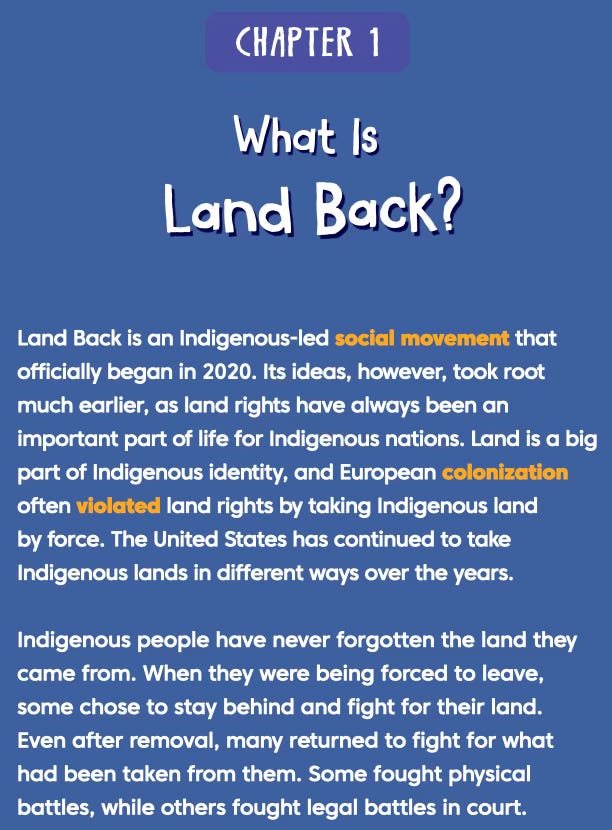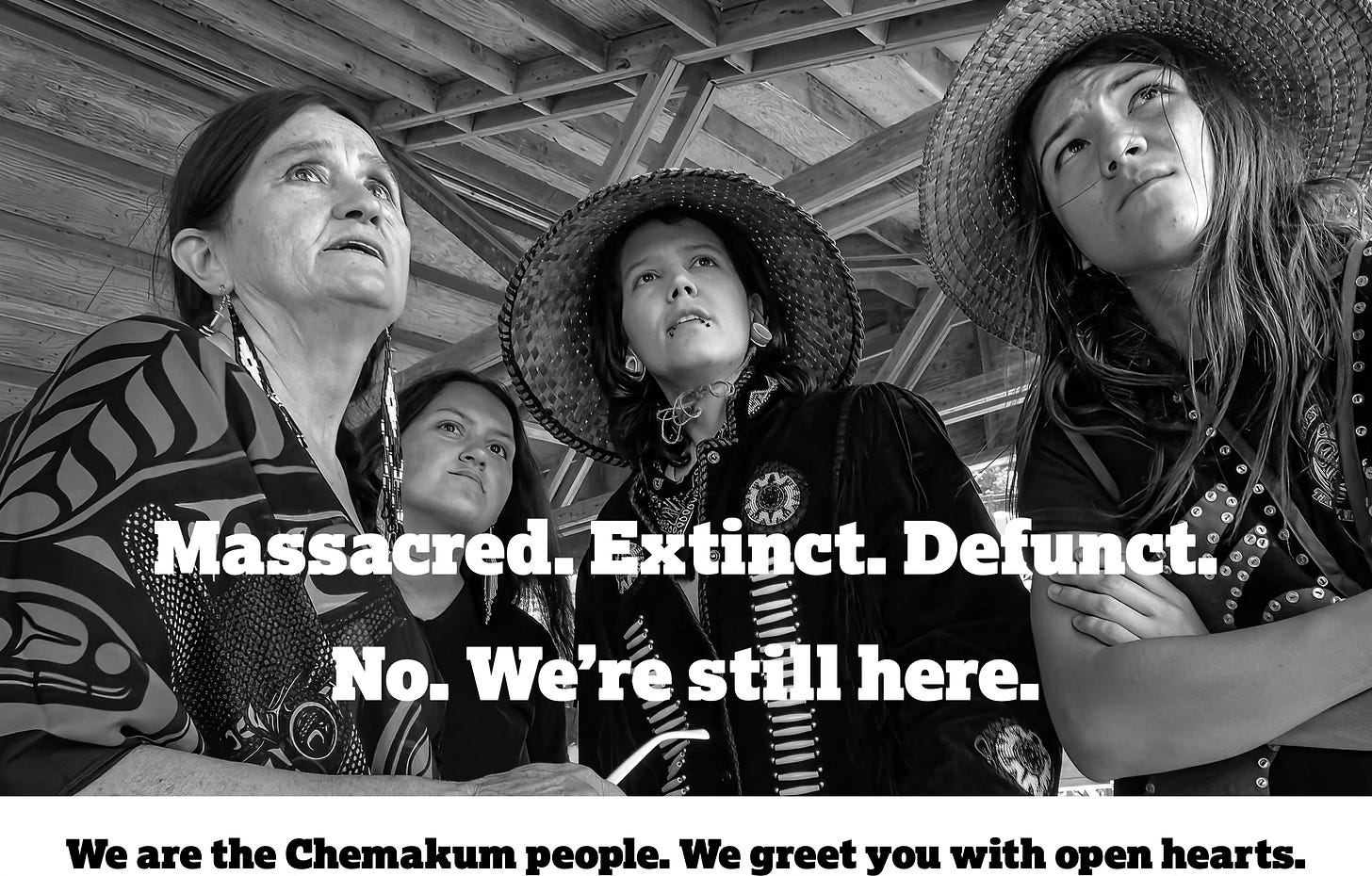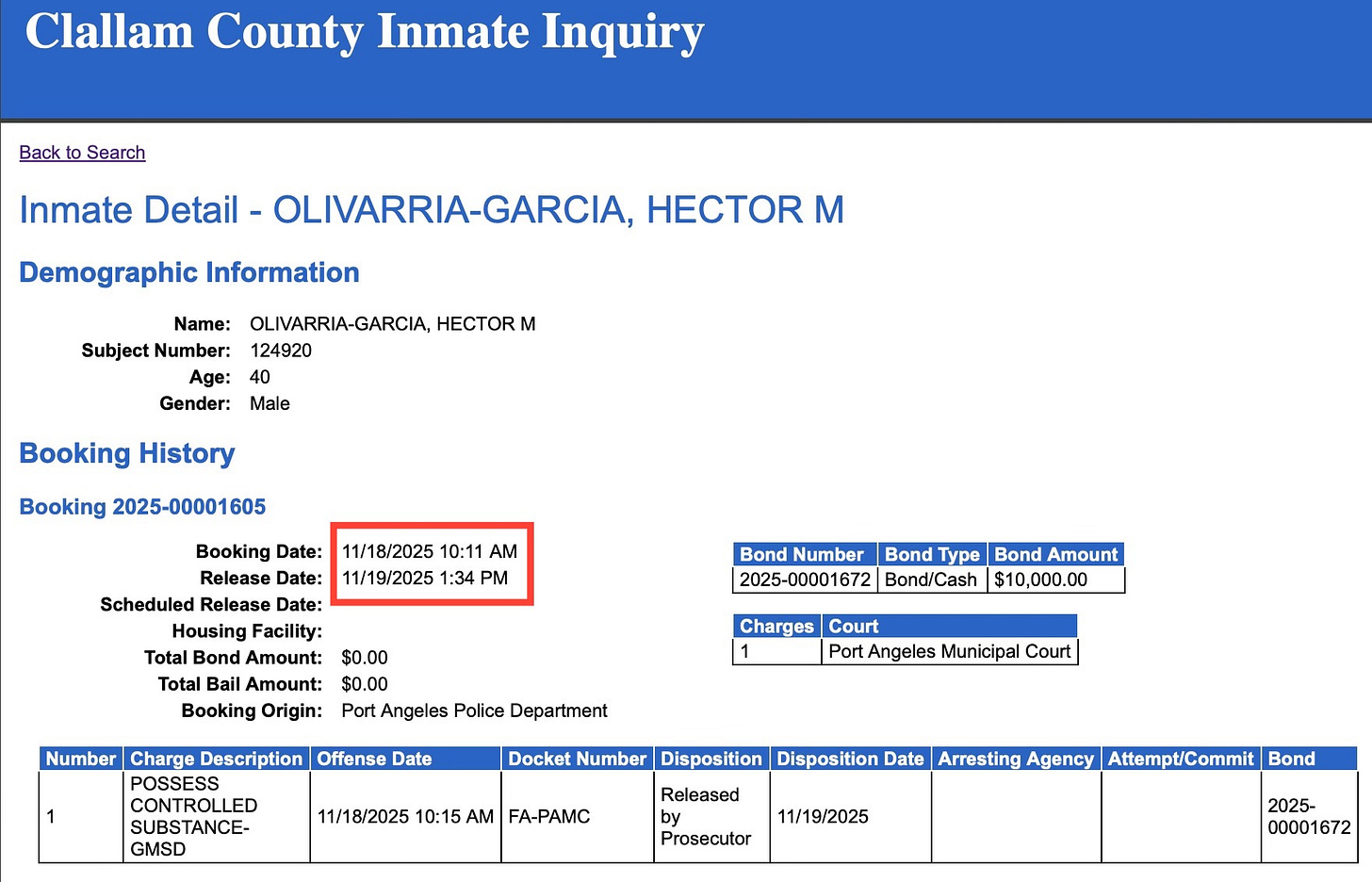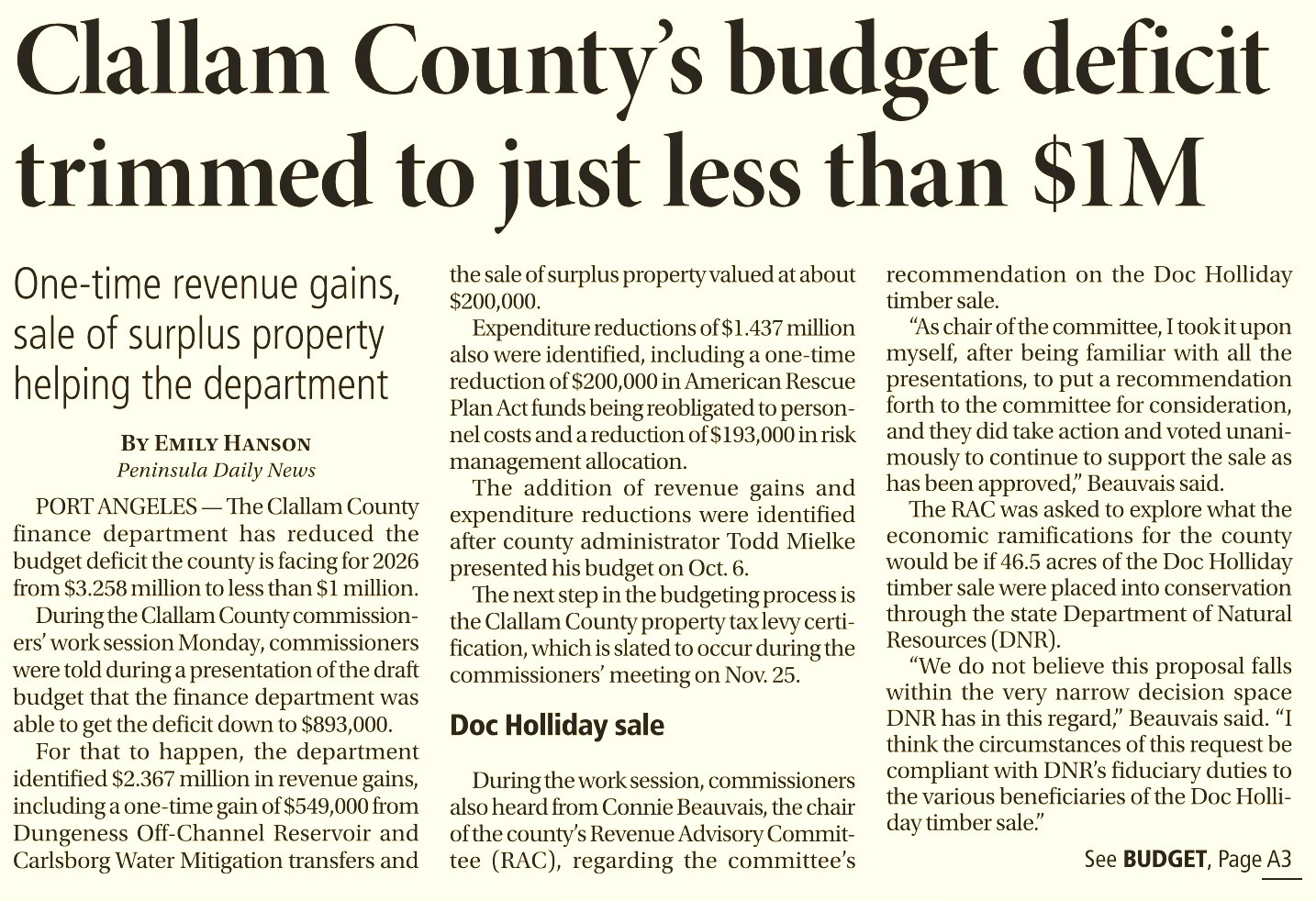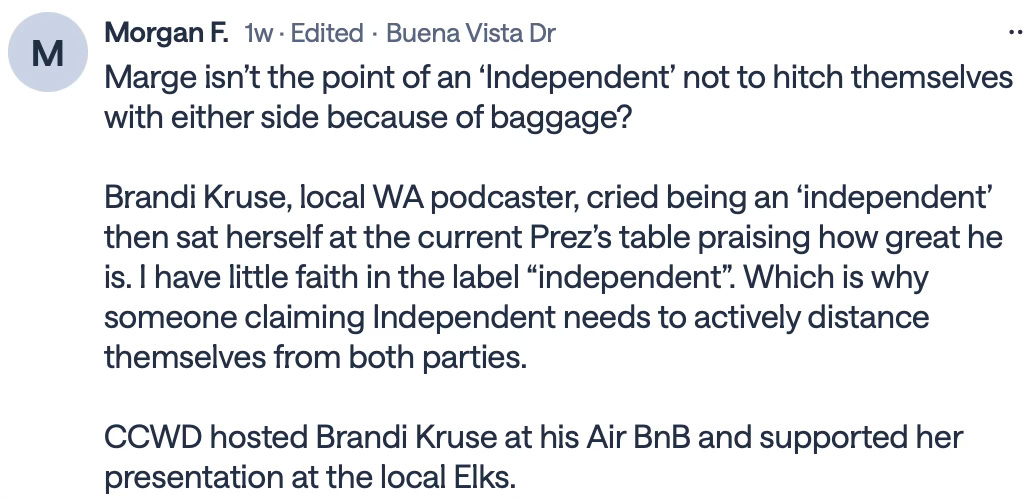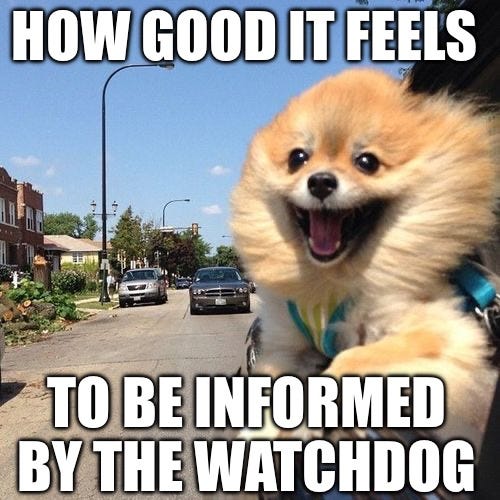Clallam County is delivering quite a week: children’s books shaping political worldviews, tribes reviving historic land claims, repeat offenders cycling through the system, and millions in state tax refunds kept out of public view. Add unpopular government expansion proposals, a shaky conservation district appeals process, and budget “crises” that conveniently ease after voters reject new taxes — and a clear theme emerges.
NOLS Recognizes “Political Movement Month”
The North Olympic Library System is highlighting Native American Heritage Month with a curated book list celebrating culture, tradition, and lived experience.
Many of these selections are thoughtful and educational—but one book on the list goes further. What Is Land Back? is a children’s book sold as part of a “racial justice in America” series.
The opening chapter defines Land Back as an “Indigenous-led social movement” rooted in the idea that European colonization forcibly took land.
While that history exists and deserves honest teaching, the framing invites very young readers to divide the world into oppressors and oppressed — and to internalize guilt for harms they never committed, involving people they never harmed.
Public institutions should teach history, not ideology. When political movements are packaged for children under the guise of cultural education, parents are owed transparency. Respectful history is essential. Guilt-based identity sorting is not.
The Chemakum Story
The Chemakum Tribe, though not federally recognized, maintains an active website detailing its history and its goals: reclaiming territory, rebuilding language, and restoring cultural identity. Their historical account includes a stark and violent chapter rarely discussed in today’s simplified “colonizer vs. colonized” framing.
According to historian David Buerge, the Chemakum people were nearly wiped out in 1847 — not by Europeans, but by coordinated attacks from the S’Klallam and Suquamish tribes. The raid destroyed the last Chemakum village, killing the men and enslaving women and children. Survivors later joined the Twana at Hood Canal. It is a tragic, painful, and important story that complicates any black-and-white understanding of land history.
The Land Back movement oversimplifies history when it casts all descendants of Europeans as oppressors while ignoring the full record of who took land from whom. Honest storytelling requires the whole truth, even when it challenges preferred narratives.
Repeat Offender Released After 27 Hours
Yesterday’s report on serial offender Hector Olivarria Garcia is growing more concerning as details emerge. Garcia has cycled through multiple Washington counties — King, Thurston, Grays Harbor, and now Clallam — on a steady rotation of criminal charges. Records show he was in King County courts throughout 2023, jailed in Grays Harbor in April, and recently picked up in Port Angeles for drug possession.
Despite this long multi-county trail, Garcia was released yesterday after only 27 hours in the Clallam County Jail.
Meanwhile, Peninsula Behavioral Health’s Northview project — the $350,000-per-unit luxury-housing complex that will prioritize chronically incarcerated individuals — is preparing to house repeat offenders with no requirement for sobriety.
Welcome to Clallam County, Hector.
Washington’s Tribal Fuel Tax Refunds: $68 Million
The state’s 2024 Tribal Fuel Tax Agreement Report landed, and the numbers reveal a stunning imbalance. Tribal gas stations — including Jamestown’s Longhouse Market — collect the full 55.4-cent-per-gallon state gas tax just like every competitor. But only tribal stations receive a 75% refund of that tax. For a high-volume station like the Longhouse, that can mean an additional $2 million a year in revenue competitors never see.
In 2024 alone, tribes statewide received $68.4 million in fuel-tax refunds, while the state retained just $22.8 million. Worse, the agreements classify these payments as “personal information,” shielding details from the public and placing auditing authority in private hands. Taxpayers fund the transportation system, but have no visibility into tens of millions flowing elsewhere.
As our Clallam County Commissioners attend the Washington State Association of Counties (WSAC) leadership conference on the public’s dime this week, renegotiating these agreements would be a timely and vital conversation. But with Commissioner Mark Ozias serving as WSAC’s Vice President — and the Jamestown Tribe as his largest campaign donor — that discussion seems unlikely.
LWV Brings Water Steward Back from the Dead
The Charter Review proposal to grow county government by creating a “Water Steward” position was overwhelmingly rejected by residents — 70% opposed it in the countywide survey. But the League of Women Voters of Clallam County is not finished. In a November 12 letter to the Board of Commissioners, the LWV urges renewed action, repeating climate and resource warnings and calling the position too important to abandon.
As an organization, the LWV explicitly commits to “amplifying Indigenous voices,” partnering with tribes on policy, and supporting tribal priorities. That alignment is significant because the Dungeness River Management Team (DRMT), which the LWV repeatedly cites, is led by the Jamestown S’Klallam Tribe — the same group pushing aggressively for water restrictions, metering, and regulatory expansion.
Residents made their position clear: they do not want new layers of bureaucracy, new regulatory authorities, or new taxpayer-funded positions shaped by interest groups rather than public will. When a proposal is this unpopular, but advocacy groups continue pressing it forward anyway, it raises a basic question: Who is the government listening to?
County Budget “Crisis” Magically Shrinks After Tax Hike Fails
Not long ago, Administrator Todd Mielke warned that Clallam County’s nearly $4 million deficit might require cutting 20–25 positions. Then, through cost-cutting and new revenue streams, the deficit shrank to $2 million — but voters were still told that failure to pass a $3.75 million property tax hike would endanger public safety, election integrity, and public health.
Voters rejected the levy. And suddenly, the deficit dropped again — to just $893,000. With a newly identified $400,000 revenue source, the remaining gap is shrinking fast. No mass layoffs. No chaos. No collapse of essential services. Just basic budgeting and a willingness to live within means.
Residents deserve straight talk. If local government can largely stabilize its finances once voters say “No,” maybe the crisis wasn’t a crisis — and maybe the public shouldn’t be asked to bail out budgeting that works just fine when the pressure is on.
CCD’s New Appeals Process: Pay First, Appeal Later — and CCD Is Judge, Jury, and Decider
Following the County Commissioners’ decision to hand the Clallam Conservation District (CCD) nearly $2 million in new public funding, CCD is considering an appeals process for property owners challenging their new “Rates and Charges.” On paper, it’s a legal requirement. In practice, it is an appeals system heavily tilted toward the agency that imposes the charge.
First, property owners must pay the assessment before they are allowed to appeal it. The appeal window is tight — just 21 days after the first property-tax due date. CCD itself runs the entire process: intake, hearings, decisions, and final judgments. Appeals are heard by the same Board of Supervisors that created the charge.
Grounds for appeal are narrow, and any appeal must follow a formal hearing procedure requiring conferences, written arguments, and possible expert testimony. CCD can also privately settle cases before hearings — without public disclosure. Yes, residents can appeal to the Superior Court, but only after paying the cost of producing the entire hearing record.
For an agency now receiving millions from taxpayers, an appeals system this one——sided raises fundamental fairness concerns.
Trails, Favors, and Small-Town Influence
Commissioner Mark Ozias recently claimed that the loudest public demand for the next six years of transportation spending wasn’t about the flooding nightmare on 3 Crabs Road or the crash-prone intersections on Old Olympic Highway. No, according to him, it was a 3.5-mile connector trail for a few hundred residents of Diamond Point.
Where on earth did that come from?
A quick scroll through Nextdoor.com tells the story. Diamond Point resident Sara T. posted a celebratory thank-you to Jim Stoffer, proudly announcing that the community gave “overwhelming support” and that commissioners added the idea to the TIP.
The Diamond Point neighborhood is allowed to ask for what it wants. But when a small neighborhood’s pet project leapfrogs genuine countywide safety hazards solely because the right people whispered in the right ears, it’s not “public feedback.” It’s Clallam County politics at its most predictable. Around here, you don’t need good policy. You need good friends.

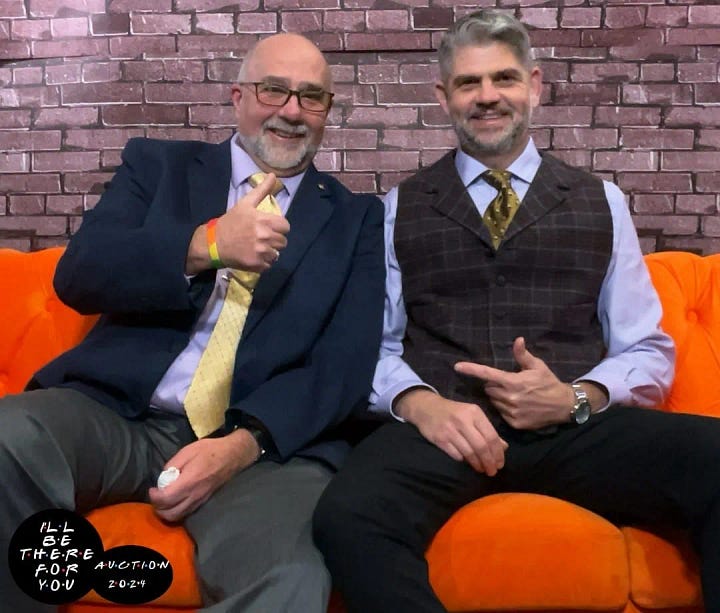
Seegers Campaign Embroiled in Scandal
Jake Seegers’ campaign for County Commissioner has gotten a warm response from voters looking for someone who isn’t welded to the political machinery. But it didn’t take long for someone on Nextdoor.com to turn enthusiasm into scandal. This time, the honor fell to Morgan Fairbanks, who popped in to announce her disappointment that Jake had “hitched his wagon to CCWD.”
But Morgan’s big reveal wasn’t about policy at all. No, her real concern—her true smoking gun—was that Jake’s campaign manager is me, the editor of CC Watchdog. Her follow-up post explained her distrust of anyone claiming to be “independent,” and then delivered her bombshell:
I once offered an Airbnb to journalist Brandi Kruse, who later attended a White House event for independent media and met the president. I wasn’t there. I didn’t meet the president. And this happened a year and a half after her stay with us. But never mind the details—some folks just need a conspiracy to get through the afternoon.
And here’s the problem with judging people by who their acquaintances once interacted with: it collapses into absurdity almost instantly.
I once worked with someone who worked with the Green River Killer (and got told by HR to quit telling everyone that Gary Ridgeway was the Green River Killer).
My aunt-in-law once worked with Mary Kay Letourneau (before she was accused of child rape).
A cousin stuffed campaign envelopes next to Ted Bundy (and thought he was a charming young man).
If anyone wants to draw a chart connecting all that to Jake’s run for office, be my guest—we could all use the entertainment. The truth is simple: voters who care about real issues will stick with Jake. Voters who care about Airbnb guest logs can keep refreshing Nextdoor. Everyone gets to pick their hobby.
Oh, and one more thing. Jake didn’t hitch his wagon to any “side” — and neither did I. We’re independents: people before parties, issues before ideology. The only side I’m on is the side of transparency. Jake is too. And so are 3,637 of you.
You’ve Made It!
If you’ve made it all the way to Story Ten, congratulations—you’ve survived a tour through Clallam County’s finest hits: misplaced priorities, pampered offenders, political convenience, and systems that work beautifully for everyone except the people funding them. Consider this your intermission break before the next round of eyebrow-raising decisions lands on the agenda.
Do yourself a favor and recharge with Clallamity Jen’s Substack. She has a talent for distilling government absurdity into memes and commentary sharp enough to startle a county administrator out of their swivel chair.
Once you’ve recovered, hop over to Strait Shooter’s satire feed for an update on Peninsula Behavioral Health’s new North View complex—complete with dishwashers, a dog washing sink, and amenities for “not exclusively dry” residents that somehow look nicer than many taxpayers’ actual homes.
Because that’s Clallam County in a nutshell: residents get hammered over minor code violations while out-of-town offenders get hotel vouchers, dishwashers, and case management. Thankfully, we still have a handful of locals who aren’t afraid to shine a light on this circus. And as always—pay attention. Someone has to.





